翻译三级笔译实务-1
往年CATTI英语三级笔译实务真题
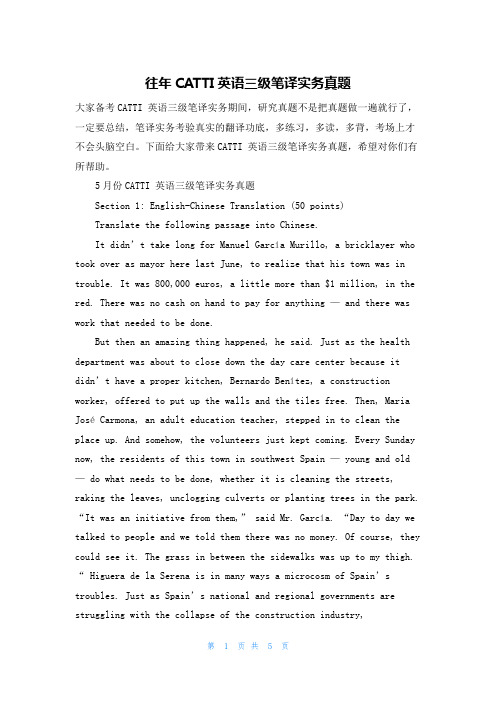
往年CATTI英语三级笔译实务真题大家备考CATTI 英语三级笔译实务期间,研究真题不是把真题做一遍就行了,一定要总结,笔译实务考验真实的翻译功底,多练习,多读,多背,考场上才不会头脑空白。
下面给大家带来CATTI 英语三级笔译实务真题,希望对你们有所帮助。
5月份CATTI 英语三级笔译实务真题Section 1: English-Chinese Translation (50 points)Translate the following passage into Chinese.It didn’t take long for Manuel García Murillo, a bricklayer who took over as mayor here last June, to realize that his town was in trouble. It was 800,000 euros, a little more than $1 million, in the red. There was no cash on hand to pay for anything — and there was work that needed to be done.But then an amazing thing happened, he said. Just as the health department was about to close down the day care center because it didn’t have a proper kitchen, Bernardo Benítez, a construction worker, offered to put up the walls and the tiles free. Then, Maria José Carmona, an adult education teacher, stepped in to clean the place up. And somehow, the volunteers just kept coming. Every Sunday now, the residents of this town in southwest Spain — young and old — do what needs to be done, whether it is cleaning the streets, raking the leaves, unclogging culverts or planting trees in the park. “It was an initiative from them,” said Mr. García. “Day to day we talked to people and we told them there was no money. Of course, they could see it. The grass in between the sidewalks was up to my thigh. “ Higuera de la Serena is in many ways a microcosm of Spain’strou bles. Just as Spain’s national and regional governments are struggling with the collapse of the construction industry,overspending on huge capital projects and a pileup of unpaid bills, the same problems afflict many of its small towns.But what has brought Higuera de la Serena a measure of fame in Spain is that the residents have stepped up where their government has failed. Mr. García says his phone rings regularly from other town officials who want to know how to do the same thing. He is servingwi thout pay, as are the town’s two other elected officials. They are also forgoing the cars and phones that usually come with the job. “We lived beyond our means,” Mr. García said. “We invested in public works thatweren’t sensible. We are in technical bankruptcy.” Even some money from the European Union that was supposed to be used forroutine operating e某penses and last until 2023 has already been spent, he said.Higuera de la Serena, a cluster of about 900 houses surrounded by farmland, and traditionally dependent on pig farming and olives, got swept up in the giddy days of the construction boom. It built a cultural center and invested in a small nursing home. But theprojects were plagued by delays and cost overruns.The cultural center still has no bathrooms. The nursing home, a whitewashed building sits on the edge of town, still unopened. Together, they account for some $470,000 of debt owed to the bank. But the rest of the debt is mostly the unpaid bills of a town that was not keeping up with its e某penses. It owes for medical supplies, for diesel fuel, for road repair, for electrical work, for musicians who played during holidays.Higuera de la Serena is not completely without workers. It still has a half-time librarian, two half-time street cleaners, someonepart-time for the sports comple某, a secretary and an administrator, all of whom are paid through various financing streams apart from the town. But the town once had a work force twice the size. And when someone is ill, volunteers have to step in or the gym and sports comple某— open four hours a day — must close.Section 2: Chinese-English Translation (50 points)Translate the following passage into English.10 年来,中国经济持续快速发展,经济实力、综合国力、人民生活水平迈上新的台阶,国家面貌发生举世瞩目的历史性变化,为促进亚洲和世界经济增长作出了重要贡献。
2022年下半年英语三级笔译(CATTI 3) 实务考试真题及参考译文
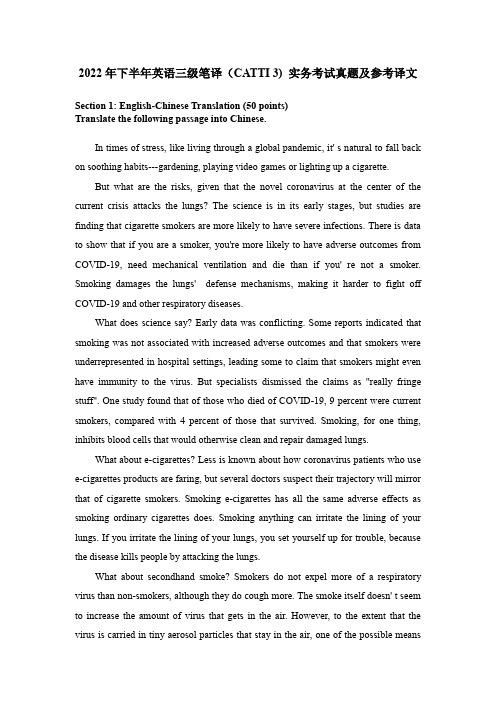
2022年下半年英语三级笔译(CATTI 3) 实务考试真题及参考译文Section 1: English-Chinese Translation (50 points)Translate the following passage into Chinese.In times of stress, like living through a global pandemic, it' s natural to fall back on soothing habits---gardening, playing video games or lighting up a cigarette.But what are the risks, given that the novel coronavirus at the center of the current crisis attacks the lungs? The science is in its early stages, but studies are finding that cigarette smokers are more likely to have severe infections. There is data to show that if you are a smoker, you're more likely to have adverse outcomes from COVID-19, need mechanical ventilation and die than if you' re not a smoker. Smoking damages the lungs' defense mechanisms, making it harder to fight off COVID-19 and other respiratory diseases.What does science say? Early data was conflicting. Some reports indicated that smoking was not associated with increased adverse outcomes and that smokers were underrepresented in hospital settings, leading some to claim that smokers might even have immunity to the virus. But specialists dismissed the claims as "really fringe stuff". One study found that of those who died of COVID-19, 9 percent were current smokers, compared with 4 percent of those that survived. Smoking, for one thing, inhibits blood cells that would otherwise clean and repair damaged lungs.What about e-cigarettes? Less is known about how coronavirus patients who use e-cigarettes products are faring, but several doctors suspect their trajectory will mirror that of cigarette smokers. Smoking e-cigarettes has all the same adverse effects as smoking ordinary cigarettes does. Smoking anything can irritate the lining of your lungs. If you irritate the lining of your lungs, you set yourself up for trouble, because the disease kills people by attacking the lungs.What about secondhand smoke? Smokers do not expel more of a respiratory virus than non-smokers, although they do cough more. The smoke itself doesn' t seem to increase the amount of virus that gets in the air. However, to the extent that the virus is carried in tiny aerosol particles that stay in the air, one of the possible meansof transmission, the smoke shows where those particles are located. One study showed that people who had been exposed to second hand smoke were more likely to contract tuberculosis and, once they got it, didn' t do as well as those who weren' t exposed to smoke. In terms of these immune-suppressive effects, as it relates to tuberculosis, secondhand smoke has adverse effects.Each virus has its unique pattern of dispersion, and scientists are starting to get a handle on how the novel coronavirus behaves. This understanding is making it possible to rank the risks of different activities from high to low to trivial.The two drivers of the spread of the disease are close contact and crowding in closed spaces, as the virus is mainly transmitted through respiratory droplets and close contact. It spreads through homeless shelter and nursing homes, where people are crowded in with many others. And it spreads through people's households. Scientists have found some trends. For example, spending time dining together or being on public transport might increase the risk of spreading or contracting the disease, while going to a market briefly for five minutes or a transient encounter while you walk or run past someone is considered low risk.The studies were all done through contact tracing, which may turn out to be humanity's greatest strategy for fighting the COVID-19 pandemic. Contact tracing can stop chains of transmission, even after a disease is widespread. Another major benefit is that it offers clues as to how the disease spreads. Each virus has its unique pattern.【参考译文】:适逢直面重重压力之际,恰似人类正身陷于这一场席卷全球的新冠肺炎疫情之图圄。
翻译三级笔译实务分类真题1_真题(含答案与解析)-交互
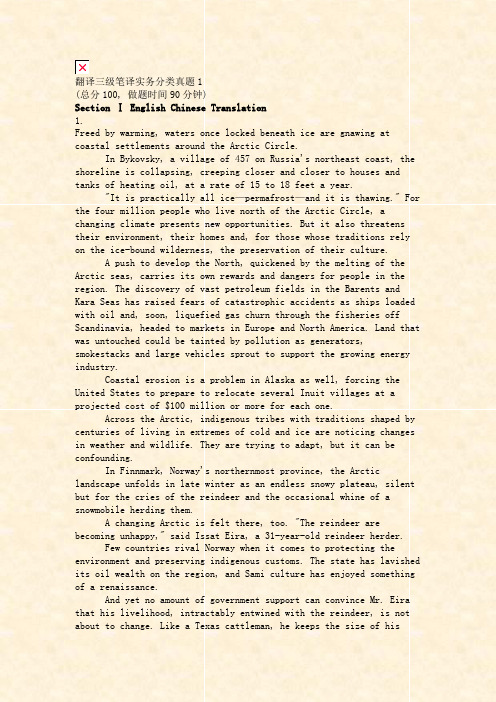
翻译三级笔译实务分类真题1(总分100, 做题时间90分钟)Section Ⅰ English Chinese Translation1.Freed by warming, waters once locked beneath ice are gnawing at coastal settlements around the Arctic Circle.In Bykovsky, a village of 457 on Russia's northeast coast, the shoreline is collapsing, creeping closer and closer to houses and tanks of heating oil, at a rate of 15 to 18 feet a year."It is practically all ice—permafrost—and it is thawing." For the four million people who live north of the Arctic Circle, a changing climate presents new opportunities. But it also threatens their environment, their homes and, for those whose traditions rely on the ice-bound wilderness, the preservation of their culture.A push to develop the North, quickened by the melting of the Arctic seas, carries its own rewards and dangers for people in the region. The discovery of vast petroleum fields in the Barents and Kara Seas has raised fears of catastrophic accidents as ships loaded with oil and, soon, liquefied gas churn through the fisheries off Scandinavia, headed to markets in Europe and North America. Land that was untouched could be tainted by pollution as generators, smokestacks and large vehicles sprout to support the growing energy industry.Coastal erosion is a problem in Alaska as well, forcing the United States to prepare to relocate several Inuit villages at a projected cost of $100 million or more for each one.Across the Arctic, indigenous tribes with traditions shaped by centuries of living in extremes of cold and ice are noticing changes in weather and wildlife. They are trying to adapt, but it can be confounding.In Finnmark, Norway's northernmost province, the Arctic landscape unfolds in late winter as an endless snowy plateau, silent but for the cries of the reindeer and the occasional whine of a snowmobile herding them.A changing Arctic is felt there, too. "The reindeer are becoming unhappy," said Issat Eira, a 31-year-old reindeer herder.Few countries rival Norway when it comes to protecting the environment and preserving indigenous customs. The state has lavished its oil wealth on the region, and Sami culture has enjoyed something of a renaissance.And yet no amount of government support can convince Mr. Eira that his livelihood, intractably entwined with the reindeer, is not about to change. Like a Texas cattleman, he keeps the size of hisherd secret. But he said warmer temperatures in fall and spring were melting the top layers of snow, which then refreeze as ice, making it harder for his reindeer to dig through to the lichen they eat."The people who are making the decisions, they are living in the south and they are living in towns," said Mr. Eira, sittinginside his home made of reindeer hides. "They don't mark the change of weather. It is only people who live in nature and get resources from nature who mark it."SSS_TEXT_QUSTI分值: 30答案:随着全球变暖,海冰逐渐融化,海水水位上涨,侵蚀着北极圈附近的沿海居住区。
英语笔译实务3-Unit1
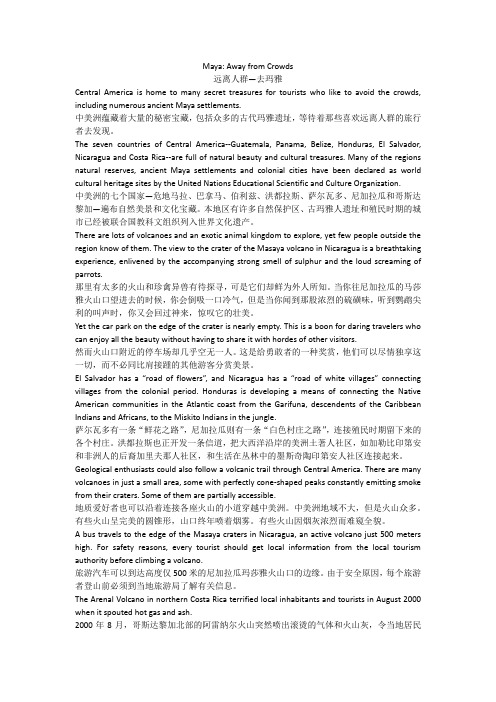
Maya: Away from Crowds远离人群—去玛雅Central America is home to many secret treasures for tourists who like to avoid the crowds, including numerous ancient Maya settlements.中美洲蕴藏着大量的秘密宝藏,包括众多的古代玛雅遗址,等待着那些喜欢远离人群的旅行者去发现。
The seven countries of Central America--Guatemala, Panama, Belize, Honduras, El Salvador, Nicaragua and Costa Rica--are full of natural beauty and cultural treasures. Many of the regions natural reserves, ancient Maya settlements and colonial cities have been declared as world cultural heritage sites by the United Nations Educational Scientific and Culture Organization.中美洲的七个国家—危地马拉、巴拿马、伯利兹、洪都拉斯、萨尔瓦多、尼加拉瓜和哥斯达黎加—遍布自然美景和文化宝藏。
本地区有许多自然保护区、古玛雅人遗址和殖民时期的城市已经被联合国教科文组织列入世界文化遗产。
There are lots of volcanoes and an exotic animal kingdom to explore, yet few people outside the region know of them. The view to the crater of the Masaya volcano in Nicaragua is a breathtaking experience, enlivened by the accompanying strong smell of sulphur and the loud screaming of parrots.那里有太多的火山和珍禽异兽有待探寻,可是它们却鲜为外人所知。
CATTI三级笔译实务全部试题真题及答案汇总
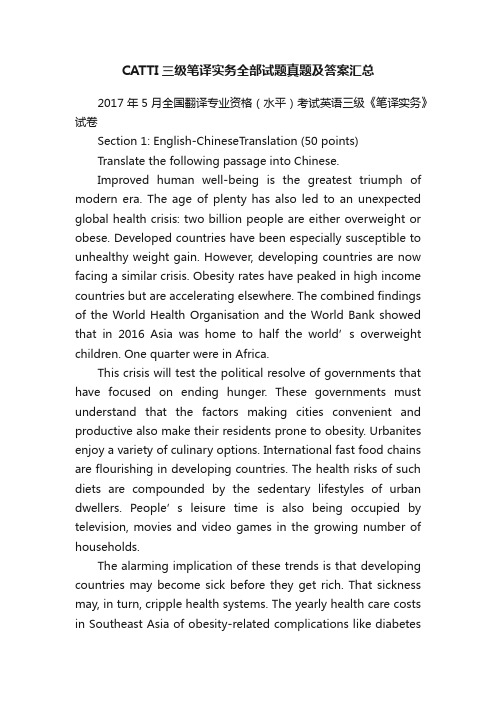
CATTI三级笔译实务全部试题真题及答案汇总2017年5月全国翻译专业资格(水平)考试英语三级《笔译实务》试卷Section 1: English-ChineseTranslation (50 points)Translate the following passage into Chinese.Improved human well-being is the greatest triumph of modern era. The age of plenty has also led to an unexpected global health crisis: two billion people are either overweight or obese. Developed countries have been especially susceptible to unhealthy weight gain. However, developing countries are now facing a similar crisis. Obesity rates have peaked in high income countries but are accelerating elsewhere. The combined findings of the World Health Organisation and the World Bank showed that in 2016 Asia was home to half the world’s overw eight children. One quarter were in Africa.This crisis will test the political resolve of governments that have focused on ending hunger. These governments must understand that the factors making cities convenient and productive also make their residents prone to obesity. Urbanites enjoy a variety of culinary options. International fast food chains are flourishing in developing countries. The health risks of such diets are compounded by the sedentary lifestyles of urban dwellers. People’s leisure time is a lso being occupied by television, movies and video games in the growing number of households.The alarming implication of these trends is that developing countries may become sick before they get rich. That sickness may, in turn, cripple health systems. The yearly health care costs in Southeast Asia of obesity-related complications like diabetesand cardiovascular disease are already as high as US $10 billion. Such diseases are an added burden on countries already struggling to manage primary health care needs.Policies related to taxation, urban design, education and the promotion of food systems may help control obesity at a lower cost than eventual medical treatment for an increasingly overweight population. Some governments have already experimented with direct interventions to control obesity, such as taxation on unhealthy foods and drinks. Thailand, Brunei, and Singapore have adopted soda tax . South Africa is likely to introduce a sugar tax beginning in April 2018. The city of Berkeley in California recognises that taxes alone are not enough to address obesity. Proceeds from the city’s sugar tax are used to support child nutrition and community health programmes. This underscores the importance of education.There is also promise in many initiatives. Urban design holds significant power to reshape lifestyle patterns and public health. Improving the attractiveness of public space can draw residents out of their cars and living rooms. A recent study of urban neighbourhoods in Shanghai and Hangzhou found that residents living in walkable neighbourhoods are healthier than residents living in less walkable neighourhoods in urban China. Finally, healthier lifestyles begin in grocery store aisles.Governments should encourage tighter connections between agricultural production systems, urban grocers and food vendors. Such initiatives can also help urban residents better understand the mechanics of food sourcing. This raises awareness about the relationship between natural foods and healthy lifestyles. Combining controls on unhealthy foods with policies that incentivise healthy eating and active lifestyles isimportant for developing countries from both an economic and social point of view. To quote the recent Global Nutrition Report, “Reducing obesity will boost global development.”Section 2: Chinese-EnglishTranslation (50 points)Translate the following passage into English.煤炭是地球上储量最丰富的能源,但目前反对使用煤炭的声浪日益高涨。
CATTI英语三级翻译考试笔译实务训练题
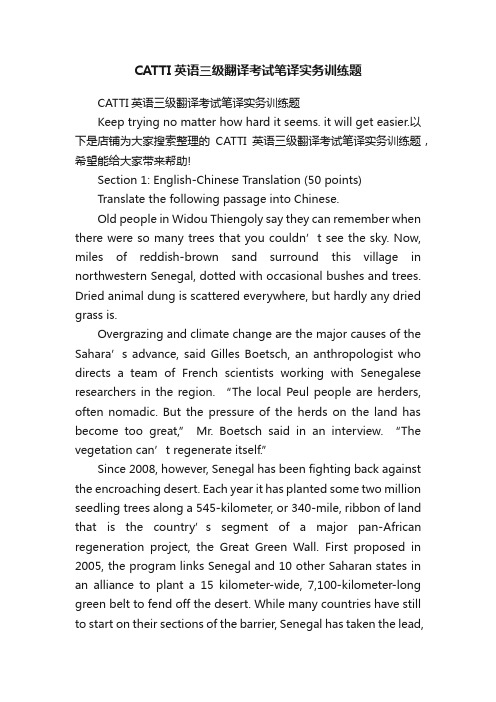
CATTI英语三级翻译考试笔译实务训练题CATTI英语三级翻译考试笔译实务训练题Keep trying no matter how hard it seems. it will get easier.以下是店铺为大家搜索整理的CATTI英语三级翻译考试笔译实务训练题,希望能给大家带来帮助!Section 1: English-Chinese Translation (50 points)Translate the following passage into Chinese.Old people in Widou Thiengoly say they can remember when there were so many trees that you couldn’t see the sky. Now, miles of reddish-brown sand surround this village in northwestern Senegal, dotted with occasional bushes and trees. Dried animal dung is scattered everywhere, but hardly any dried grass is.Overgrazing and climate change are the major causes of the Sahara’s advance, said Gilles Boetsch, an anthropologist who directs a team of French scientists working with Senegalese researchers in the region. “The local Peul people are herders, often nomadic. But the pressure of the herds on the land has become too great,” Mr. Boetsch said in an interview. “The vegetation can’t regenerate itself.”Since 2008, however, Senegal has been fighting back against the encroaching desert. Each year it has planted some two million seedling trees along a 545-kilometer, or 340-mile, ribbon of land that is the country’s segment of a major pan-African regeneration project, the Great Green Wall. First proposed in 2005, the program links Senegal and 10 other Saharan states in an alliance to plant a 15 kilometer-wide, 7,100-kilometer-long green belt to fend off the desert. While many countries have still to start on their sections of the barrier, Senegal has taken the lead,with the creation of a National Agency for the Great Green Wall.“This semi-arid region is becoming less and less habitable. We want to make it possible for people to continue to live here,” Col. Pap Sarr, the agency’s technical director, said in an interview here. Colonel Sarr has forged working alliances between Senegalese researchers and the French team headed by Mr. Boetsch, in fields as varied as soil microbiology, ecology, medicine an d anthropology. “In Senegal we hope to experiment with different ways of doing things that will benefit the other countries as they become more active,” the colonel said. Each year since 2008, from May to June, about 400 people are employed in eight nurseries, choosing and overseeing germination of seeds and tending the seedlings until they are ready for planting. In August, 1,000 people are mobilized to plant out rows of seedlings, about 2 million plants, allowing them a full two months of the rainy season to take root before the long, dry season sets in.After their first dry season, the saplings look dead, brown twigs sticking out of holes in the ground, but 80 percent survive. Six years on, trees planted in 2008 are up to three meters, or 10 feet, tall. So far, 30,000 hectares, or about 75,000 acres, have been planted, including 4,000 hectares this summer. There are already discernible impacts on the microclimate, said Jean-Luc Peiry, a physical geography professor at the Université Blaise Pascal in Clermont-Ferrand, France, who has placed 30 sensors to record temperatures in some planted parcels.“Preliminary results show that clumps of four to eight small trees can have an important impact on temperature,” Professor Peiry said in an interview. “The trans piration of the trees creates a microclimate that moderates daily temperature extremes.”“The trees also have an important role in slowing the soil erosion caused by the wind, reducing the dust, and acting like a large rough doormat, halting the sand-laden winds from the Sahara,” he added. Wildlife is responding to the changes. “Migratory birds are reappearing,” Mr. Boetsch said.The project uses eight groundwater pumping stations built in 1954, before Senegal achieved its independence from France in 1960. The pumps fill giant basins that provide water for animals, tree nurseries and gardens where fruit and vegetables are grown.Section 2: Chinese-English Translation (50 points)Translate the following passage into English.健康是促进人的全面发展的必然要求。
2021年上半年英语三级笔译(CATTI 3) 实务考试真题及参考译文
2021年上半年英语三级笔译(CATTI 3) 实务考试真题及参考译文Section 1: English-Chinese Translation (50 points)Translate the following passage into Chinese.Are you having difficulty following diets? Our lives are way more complex than those which allow us to stick to a monotonous restrictive diet.Food psychologist Ridhi Golechha said, "If all of us could follow diets, we'd all have reached our goals. Real-life stresses such as lockdown anxiety, relationship conflicts,workload, financial stresses, exasperating parenting, and so much more directly impact how we feel and by virtue, what we eat. If, on paper, diets were so easy to follow, then we'd all be part of that tiny ten percent of people in the word (athletes, models, or actresses) - who are permanently fit.We all know of those rough days when all we want is to drown our faces in a tub of ice cream or reach out for that melting chocolate cake. "Emotional eating is nothing but eating our emotions. We're all human with emotions and hunger. By that definition, all of us are emotional eaters, we turn to food when we're overwhelmed with anger, sadness, frustration, or any other significant emotion!" explained Ridhi.There's a reason why the butterfly comes back to suck sweet nectar from the flowers, in turn pollinating the rest of the garden. Humans, much like animals, birds,and insects, are hardwired for pleasure. But here's the catch: we humans are afraid of receiving pleasure. Many fear that if they allow themselves to eat a slice of cheesy pizza, they'll be overwhelmed with pleasure, lose control, and end up finishing the whole pizza.We fear this would result in a failed diet, we light gain, and massive guilt, so we avoid it altogether. But it doesn't work."Biology suggests otherwise. Like every other species:homo sapiens were also built for survival. It is pleasure that drives humans to repeat the feel-good behaviour endlessly," explained Ridhi.When does emotional eating become worrisome? "Largely, there's nothing wrong with that. We do eat to manage and cope with our feelings, especially those that don't feel so good because eating itself is so biologically rewarding. It's completely okay ifwe're doing it once in a while, because as I said we're all evolutionary wired to emotional eating. However, if we're constantly depending on food to swallow our difficult emotions and discomforts, leaving us with a feeling of guilt constantly at the end of it, then definitely, we need to work on it," said Ridhi.What can we do to reduce emotional eating? According to Rldhi, the reason we fall diets is that we try to fight biology and suppress our emotions, which only works temporarily. To make long-lasting changes, we must address the root causes of emotional eating. Here are a few tips to get you started:First, don't skip meals. Starving often confuses your biological hunger drives and makes you more vulnerable to eating your emotions. Second, understand the difference between actual physical hunger versus emotional hunger. Third, make a list of the top three emotions you feel weekly and start finding different ways to cope with them. Fourth, talk to an expert. It's better not to ignore your emotional eating since it can later cause health issues like bloating, acid and constipation, etc. Fifth, go for a walk or do something completely different that will take away your urge by distracting you momentarily.Emotional eating is a message that reveals a deeper problem. Understanding yourself and the way you eat can address the root causes and enable you to live a life that is beyond food obsessions and the fear of failing your diets.【参考译文】:你是否很难坚持规律饮食?生活十分复杂,让我们很难坚持单一且有节制的饮食规律。
英语翻译三级笔译实务真题2018年5月及答案解析
英语翻译三级笔译实务真题2018年5月及答案解析
(1/1)SectionⅠEnglish Chinese Translation
Translate the following two passages into Chinese .
第1题
All Luciano Faggiano wanted when he purchased the seemingly unremarkable building at 56 Via Ascanio Grandi, was to open a restaurant. The only problem was the toilet. Sewage kept backing up. So Mr. Faggiano enlisted his two older sons to help him dig a trench and investigate. He predicted the job would take about a week. “We found underground corridors and other rooms, so we kept digging,” said Mr. Faggiano, 60. His search for a sewage pipe, which began in 2000, became one family’s tale of discovery.
翻译三级笔译实务-1_真题(含答案与解析)-交互
翻译三级笔译实务-1(总分100, 做题时间90分钟)Section Ⅰ English Chinese TranslationTranslate the following passage into Chinese. The time for this section is 120 minutes.1.A few weeks back, I asked a 14-year-old friend how she was coping with school.Referring to stress, she heaved a big sigh and said: "Aiyah, anything bad that can happen has already happened."Her friends nearby then started pouring out their woes about which subjects they found hard, and so on. Pessimism again, in these all-too-familiar remarks about Singapore's education system, widely regarded as too results-oriented, and I wonder why I even bothered to ask.The school system of reaching for A's underlies the country's culture, which emphasizes the chase for economic excellence where wealth and status are must-haves.Such a culture is hard to change.So when I read of how the new Remaking Singapore Committee had set one of its goals as challenging the traditional roads to success, encouraging Singaporeans to realize alternative careers in the arts, sports, research or as entrepreneurs, I had my doubts about its success in this area, if not coupled with help from parents themselves.The new Remaking Singapore Committee is a brainchild of the Singaporean Prime Minister, formed to make Singaporeans look beyond the five C's: cash, condos, clubs, credit cards and cars, to help prepare the nation for the future.It is good that the government wants to do something about the country's preoccupation with material success. But it will be alosing battle if the family unit itself is not involved because I believe **mittee's success is rooted in a revamp of an entire culture built from 37 years of independence.This makeover has to start with the most basic societal unit—the family.Parents should not drown their children in mantras of I-want-hundred-marks. Tuition lessons are not the be-all and end-all of life. And a score of 70 for a Chinese paper is definitely not the end of life.If ever I become a parent, I will bring my children camping. I will show them that cooking food in a mess tin over a campfire isfun. I will teach them that there is nothing dirty about lying on a sleeping bag over grass.In fact, it is educational because Orion is up there in the night sky with all the other bright stars whose shapes and patterns tell something more than a myth. For instance, they give directions to the lost traveler, I will say.And who knows, my child may become an astronomer years down the road. All because of the nights I spent with him watching the twinkles in the sky.That's my point. Parents should teach their children thatthere's more to life than studies. Better still if the nation's leaders echo that idea as well.This way, when their children aspire to be the next Joscelin Yeo, they won't feel like they are fighting a losing battle against a society that holds doctors and lawyers in awe.However, the culture that babysits economic excellence is deeply ingrained and so are the mindsets of many parents. But parents can take the cue from the new Remaking Singapore Committee and be aware of giving their children the right kind of education.It is now wait-and-see if, say, 10 years down the road, more would choose alternative careers. Hopefully, by then no one would think sportsmen or musicians as making too big a sacrifice in chasing their dreams.SSS_TEXT_QUSTI分值: 60几个星期前,我问一个14岁的朋友她如何应对自己的学业。
2008年11月翻译资格考试三级英语笔译实务真题及答案
2008年11月翻译资格考试三级英语笔译实务真题及答案试题部分:Section 1: English-Chinese Translation (英译汉) Translate the following passage into Chinese.LONGYEARBYEN, Norway —With plant species disappearing at an alarming rate, scientists and governments are creating a global network of plant banks to store seeds and sprouts, precious genetic resources that may be needed for man to adapt the world’s food supply to climate change.This week, the flagship of that effort, the Global Seed Vault near here, received its first seeds, millions of them. Bored into the middle of a frozen Arctic mountain topped with snow, the vault’s goal is to store and protect samples of every type of seed from every seed collection in the world.As of Thursday, thousands of neatly stacked and labeled gray boxes of seeds —peas from Nigeria, corn from Mexico —reside in this glazed cavelike structure, forming a sort of backup hard drive, in case natural disasters or human errors erase the seeds from the outside world.Descending almost 500 feet under the permafrost, the entrance tunnel to the seed vault is designed to withstand bomb blasts and earthquakes. An automated digital monitoring system controls temperature and provides security akin to a missile silo or Fort Knox. No one person has all the codes for entrance.The Global Vault is part of a broader effort to gather and systematize information about plants and their genes, which climate change experts say may indeed prove more valuable than gold. In Leuven, Belgium, scientists are scouring the world for banana samples and preserving their shoots in liquid nitrogen before they become extinct.A similar effort is under way in France on coffee plants. A number of plants, most from the tropics, do not produce seeds that can be stored.For years, a hodgepodge network of seed banks has been amassing seed and shoot collections in a haphazard manner. Labs in Mexico banked corn species. Those in Nigeria banked cassava. Now these scattershot efforts are being urgently consolidated and systematized, in part because of better technology to preserve plant genes and in part because of the rising alarm about climate change and its impact on world food production.“We started thinking about this post-9/11 and on the heels of Hurricane Katrina,” said Cary Fowler, president of the Global Crop Diversity Trust, a nonprofit group that runs the vault. “Everyone was saying, why didn’t anyone prepare for ahurricane before? We knew it was going to happen.“Well, we are losing biodiversity every day —it’s a kind of drip, dr ip, drip. It’s also inevitable. We need to do something about it.”This week the urgency of the problem was underscored as wheat prices rose to record highs and wheat stores dropped to the lowest level in 35 years. A series of droughts and new diseases cu t wheat production in many parts of the world. “The erosion of plants’ genetic resources is really going fast,” said Dr. Rony Swennen, head of the division of crop biotechnology at the Catholic University of Leuven in Belgium, who has preserved half of the world’s 1,200 banana types. “We’re at a critical moment and if we don’t act fast, we’re going to lose a lot of plants that we may need.”The United Nations International Treaty on Plant Genetic Resources, ratified in 2004, created a formal global network for banking and sharing seeds, as well as for studying their genetic traits. Last year, its database received thousands of new seeds.A system of plant banks could be crucial in responding to climate crises since it could identify genetic material and plant strains better able to cope with a changed environment.Here at the Global Vault, hundreds of gray boxes containing seeds from places ranging from Syria to Mexico were moved this week into a freezing vault to be placed in suspended animation. They harbor a vast range of qualities, like the ability to withstand drier, warmer climate.Section 2: Chinese-English Translation (汉译英) Translate the following passage into English.在上海的现代化轻轨列车上,上班族有的在打手机,有的在用笔记本电脑,有的在观赏车内顺平显示器上播放的电影。
- 1、下载文档前请自行甄别文档内容的完整性,平台不提供额外的编辑、内容补充、找答案等附加服务。
- 2、"仅部分预览"的文档,不可在线预览部分如存在完整性等问题,可反馈申请退款(可完整预览的文档不适用该条件!)。
- 3、如文档侵犯您的权益,请联系客服反馈,我们会尽快为您处理(人工客服工作时间:9:00-18:30)。
翻译三级笔译实务-1(总分:100.00,做题时间:90分钟)一、{{B}}Section Ⅰ English Chinese Translation{{/B}}(总题数:1,分数:60.00)1.A few weeks back, I asked a 14-year-old friend how she was coping with school. Referring to stress, she heaved a big sigh and said: "Aiyah, anything bad that can happen has already happened." Her friends nearby then started pouring out their woes about which subjects they found hard, and so on. Pessimism again, in these all-too-familiar remarks about Singapore's education system, widely regarded as too results-oriented, and I wonder why I even bothered to ask. The school system of reaching for A's underlies the country's culture, which emphasizes the chase for economic excellence where wealth and status are must-haves. Such a culture is hard to change. So when I read of how the new Remaking Singapore Committee had set one of its goals as challenging the traditional roads to success, encouraging Singaporeans to realize alternative careers in the arts, sports, research or as entrepreneurs, I had my doubts about its success in this area, if not coupled with help from parents themselves. The new Remaking Singapore Committee is a brainchild of the Singaporean Prime Minister, formed to make Singaporeans look beyond the five C's: cash, condos, clubs, credit cards and cars, to help prepare the nation for the future. It is good that the government wants to do something about the country's preoccupation with material success. But it will be a losing battle if the family unit itself is not involved because I believe the committee's success is rooted in a revamp of an entire culture built from 37 years of independence. This makeover has to start with the most basic societal unit—the family. Parents should not drown their children in mantras of I-want-hundred-marks. Tuition lessons are not the be-all and end-all of life. And a score of 70 for a Chinese paper is definitely not the end of life. If ever I become a parent, I will bring my children camping. I will show them that cooking food in a mess tin over a campfire is fun. I will teach them that there is nothing dirty about lying on a sleeping bag over grass. In fact, it is educational because Orion is up there in the night sky with all the other bright stars whose shapes and patterns tell something more than a myth. For instance, they give directions to the lost traveler, I will say. And who knows, my child may become an astronomer years down the road. All because of the nights I spent with him watching the twinkles in the sky. That's my point. Parents should teach their children that there's more to life than studies. Better still if the nation's leaders echo that idea as well. This way, when their children aspire to be the next Joscelin Yeo, they won't feel like they are fighting a losing battle against a society that holds doctors and lawyers in awe. However, the culture that babysits economic excellence is deeply ingrained and so are the mindsets of many parents. But parents can take the cue from the new Remaking Singapore Committee and be aware of giving their children the right kind of education. It is now wait-and-see if, say, 10 years down the road, more would choose alternative careers. Hopefully, by then no one would think sportsmen or musicians as making too big a sacrifice in chasing their dreams.(分数:60.00)__________________________________________________________________________________________ 正确答案:()解析:几个星期前,我问一个14岁的朋友她如何应对自己的学业。
谈到压力,她深叹一口气说:“哎呀,这儿事要多糟,有多糟。
” 随后,她周围的朋友便开始就他们认为那些难学的学科倾诉自己的苦恼。
人们普遍认为,新加坡的教育制度过分注重成绩,而这些孩子耳熟能详的言晤再次表现了对新加坡教育制度的悲观情绪。
我不知道自己为什么还要费心一问。
追求功课得优的学校体制构成了新加坡文化的基础,这一文化重在追求经济上的杰出成就,而这一成就则体现在一定要获得财富和地位。
这种文化是难以改变的。
新成立的改造新加坡委员会已将其目标之一确定为向传统的成功之路发起挑战,鼓励新加坡人去从事其它职业,如艺术,体育、研究或成为企业家。
当我获知此情时,我怀疑如果没有家长的配合,这方面的改造可否成功。
成立改造新加坡委员会是新加坡总理的设想,旨在帮助国家准备应付未来,使新加坡人不要只盯着钞票、公寓、俱乐部、信用卡和汽车。
新加坡政府想针对本国物质成功为先的理念采取行动,这是件好事。
但如果没有家庭单位的参与,这种行动将会是一场失败之战,因为我认为只有彻底改变独立37年来形成的一种整体文化,改造新加坡委员会才能取得成功。
而这种改变必须始于最基本的社会单位——家庭。
家长们不应当使孩子禁锢于“我要得100的约束。
学科的课程决定不了生活中的成败。
一篇中文论文得70分绝不意味着生活无望。
如果有朝一日我成为家长,我要带我的孩子去露营,向他们演示用军用饭盒在篝火上煮饭是一种乐趣,告诉他们躺在草地上的睡袋里一点也不脏。
实际上,这是有教育意义的,因为猎户星座与其它明亮的星星高挂夜空,它们的形态和图案诉说的不仅仅是一个神话。
例如,我认为它们可以为迷路的旅行人指引方向。
说不定我的孩子可能会在数年后成为一个天文学家,而这一切则源干我与他一起在夜晚观察空中闪烁的星星。
这就是我的观点。
家长应该教育自己的孩子,生活中除了学业外还有更丰富的内容。
如果国家领导人也认同那种观点就更好了。
由此,当孩子们渴望成为另一个杨玮玲(JOSCELIN YEO)时,他们就不会感到,在面对一个敬畏医生和律师的社会时,他们要进行一场失败之战。
然而,这种呵护经济成就感的文化根深蒂固,许多家长的思想倾向也是如此。
但家长们可以从改造新加坡委员会那里得到启示,意识到要给予自己的孩子正确的教育。
